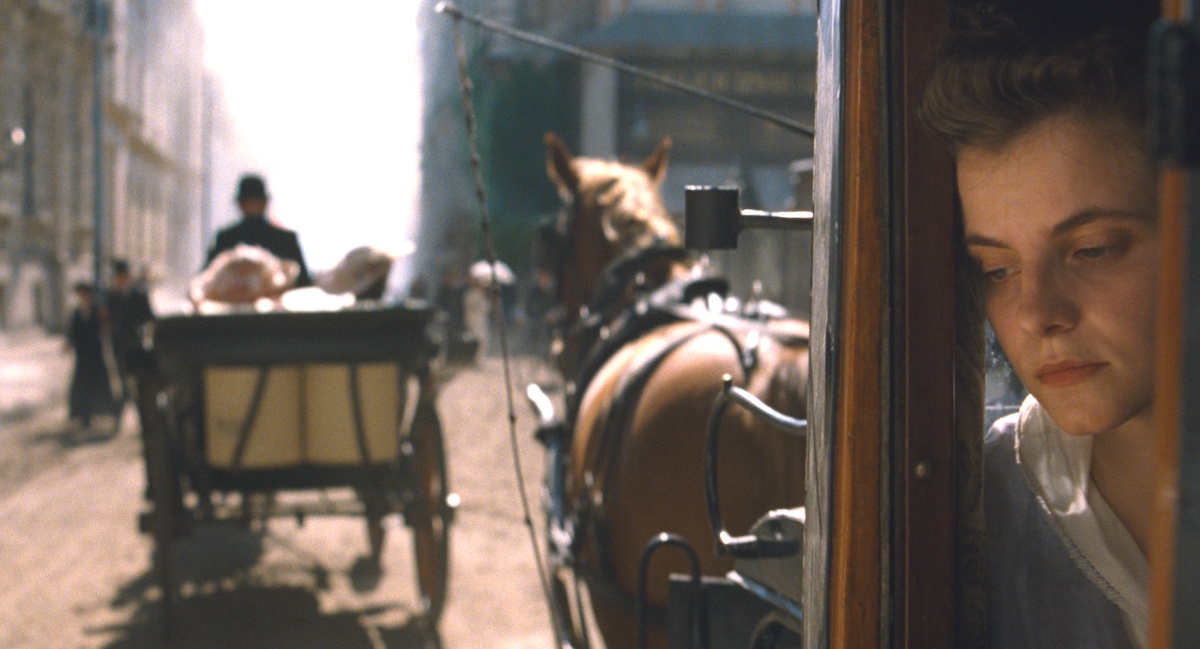Venice Film Review: ‘Sunset’
By Jay Weissberg
LOS ANGELES (Variety.com) – Expectations were always going to be too high for “Sunset,” László Nemes’ follow-up to his extraordinary Oscar-winning “Son of Saul.” Given how his first feature re-invented the Holocaust film genre, jettisoning the usual sentimentality for a terrifyingly immersive plunge into hell, it was natural to think he’d take his next subject, Budapest on the brink of World War I, and show a refined world careening towards chaos. Alas, the chaos is there but without the coherence necessary to balance sensorial turmoil with genuine meaning.
In terms of pure visual impact, Mátyás Erdély’s 35mm camera impresses with bravura agility, wandering through the impressive sets with Kubrickian urgency, yet the befuddling story of a young woman encountering seething violence while searching for her brother destabilizes without making any situation or character either real or interesting. Sales have been brisk in the lead-up to the Venice premiere, yet distributors like Sony Picture Classics (who has U.S. rights) will have a difficult time finding patient audiences satisfied only with the notable mise-en-scène.
We know from his debut that Nemes is unafraid to tackle big themes, and the period just before the epoch-changing moment when the “Guns of August” plunged Europe into a bloody conflagration certainly fits the bill. His aim is nothing less than to capture with disorienting images the moment when Europe committed suicide. “This suicide remains a mystery until this very day,” he’s quoted as saying, yet calling the causes of World War I a mystery is ridiculous, on any level, and certainly doesn’t help our understanding of one of recent history’s most troubling watershed moments. “” is his flip-side to Murnau’s “Sunrise” (why oh why do so many directors feel the need to appropriate the 1927 masterpiece?), yet that film was grounded in human emotions buffeted by modernity, whereas Nemes jettisons all but a simulacrum of humanity in favor of a questionable subjectivity.
Irisz Leiter (Juli Jakab) arrives in Budapest from Trieste looking for work at the city’s most renowned millinery establishment, which not coincidentally bears her name. Orphaned in mysterious circumstances (never revealed) at the age of two, she’s trying to connect with her legacy through the shop her parents once owned, but the new proprietor Oszkár Brill (Vlad Ivanov) sends her away, clearly threatened by her presence. Stepping out of the boutique’s rarefied atmosphere into the cacophonous streets of 1913 Budapest thrusts her into the jarring hubbub of modernity and affords Nemes the kind of sudden transition he does so well. At a boarding house she’s attacked by Gáspár (Levente Molnár), an unstable coachman muttering something about the Leiter son; Irisz knows nothing about a brother, so tries to find some answers.
The information she gathers is fragmentary and troubling: Kálmán was accused of murdering and dismembering Count Rédey, whose semi-mad widow, the countess (Julia Jakubowska), remains in full mourning five years on. Brill and his staff are organizing celebrations for the 30th anniversary of Leiter’s shop and don’t want to be bothered by Irisz’s inquiries, but she persists in her search, full of strange encounters with menacing figures who hint at things without ever revealing anything substantial. Given that the film is shot like a dream-state, clearly we’re not meant to question how she gains access to various locales such as the Rédey palace, where she sees the countess being brutalized by Otto von Koenig (Christian Harting), a sadistic arrival from Vienna.
By now, it becomes obvious that narrative coherence isn’t what Nemes or his two fellow scriptwriters are aiming for, and making heads or tails out of how people are connected, and why, is a lost cause. Is Kálmán the bearded man calling himself Sándor Jakab (Marcin Czarnik), who menacingly tells Irisz to leave the city? Is he the hidden leader of a group of anarchists gathering at night who seem to be preparing for some action around the time of the celebrations at Leiter’s? Irisz keeps moving between the refined yet tense atmosphere of the millinery to the threatening world outside, searching for answers neither she nor the audience ever find.
The mystery around this air of dread becomes so perverse that one half-expects Irisz to be taken in by a coven, à la “Rosemary’s Baby,” especially when she appears at the palace of an unshod prince (Tom Pilath) and is terrorized by the nobleman and his associates. Unlike Nemes’ claim to the eternal mystery of the causes of World War I, the mystery here is in what’s happening rather than why. “Sunset” aims to create a destabilizing atmosphere in which the decadent upper classes indulge in perverse machinations while the city around them seethes with discontent and violence, leading to an inevitable clash that Nemes makes unnecessarily obvious with a final shot in the trenches. Unlike the elegant complexity of his countryman Miklós Bánffy’s masterly trilogy of novels covering the same period, “Sunset” is all smoke and mirrors leading to a facile reflection on the carnage that marked the start of the modern era.
Since no character feels real, perhaps it’s unnecessary to complain that Jakab, so affecting in “Son of Saul,” is made to register but two emotions: tense and intense. She’s barely off screen, often seen from behind as the camera prowls near her neck much as it trailed Géza Röhrig in Nemes’ debut. The great difference however is that Erdély’s unbearably claustrophobic lensing brilliantly matched the “Son of Saul” storyline, whereas here its admirable boldness is unattached to a decipherable narrative. Heaping praise on the visuals doesn’t compensate for the film’s significant flaws, unless reproducing a disconnected nightmare is a sufficient goal. Costume designer Györgyi Szakács and the team of milliners deserve recognition for the splendid hats; Nemes pointedly uses them as symbols of extravagant uselessness soon to be tossed onto the bonfire begun in Sarajevo, but they remain objects of beauty.

